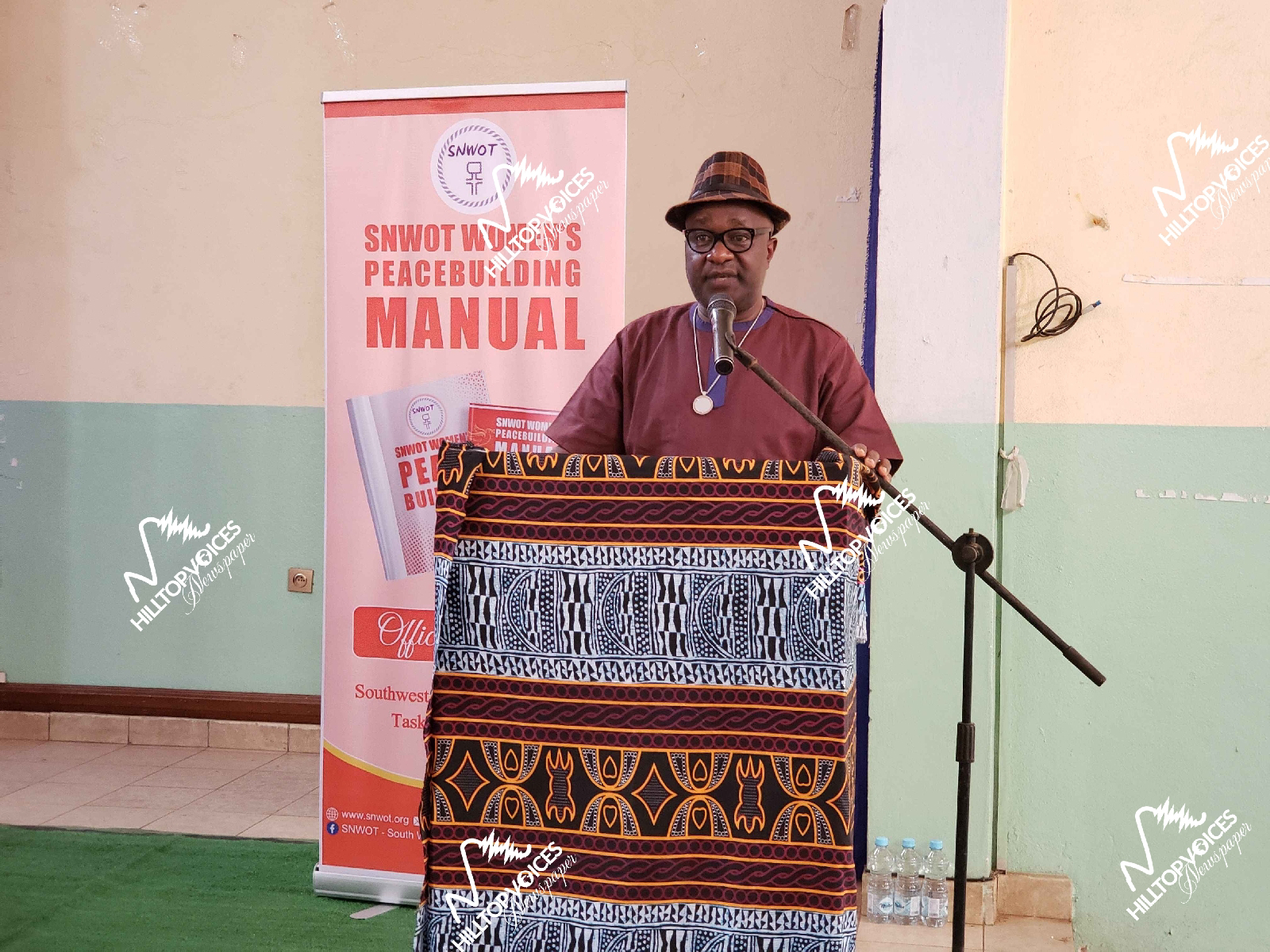Since their creation in May 2019 during the peak of the ongoing Anglophone crisis, the South West/North West Women's Taskforce (SNWOT) has emerged as a pioneering force advocating for lasting peace in Cameroon’s conflict-hit North West and South West Regions. Known for their bold initiatives like intercepting Prime Minister Dion Ngute during his 2019 fact-finding mission and influencing the Major National Dialogue, SNWOT women have consistently championed inclusive peacebuilding.
On Wednesday, 8 January 2025, this coalition of determined women took another giant step by launching their Women's Peacebuilding Manual in Bamenda. This manual according to them is a resource tailored to empower grassroots women peacebuilders with essential skills, tools, and strategies for sustainable peace in their communities.
According to the Peacebuilding Manual team lead, the manual developed in over four years with the support of swisspeace, is justification to the resilience, creativity, and dedication of SNWOT and its partners. Waah Clotilda Andiensa, Executive Director of the Centre for Advocacy in Gender Equality and Action for Development (CAGEAD) and the North West Regional Coordinator for SNWOT, led the manual’s creation.
“This project has been a labour of love. Despite the many challenges limited resources, tight deadlines, and the complexity of the subject matter, our team remained steadfast. This manual is not just a resource; it is a symbol of hope and resilience for women affected by conflict and violence in the North West and South West regions. It underscores the power of women’s leadership and the importance of inclusion in peacebuilding.” Waah Clotilda said reflecting on the process,
The manual adopts a rights-based approach, addressing justice, the rule of law, and the importance of women's active participation in conflict prevention, management, and resolution. It provides training modules on topics such as community dialogue, peace education, economic empowerment, and safety measures for women peacebuilders. Innovative activities, including creative arts for peace, cook-out sessions, and intergenerational dialogues, aim to foster reconciliation and collaboration within communities.
SNWOT has been relentless in amplifying women’s voices in peace mediation, conflict resolution, and decision-making. Dr Sally Mboumien, the first coordinator of SNWOT, emphasised the organisation’s focus.
“SNWOT emerged to promote peace, reconciliation, and social cohesion while advocating for women’s meaningful participation at all levels of decision-making. This manual reinforces our commitment to building a more peaceful and inclusive society.” she said
The manual also highlights challenges faced by women peacebuilders, such as gender-based violence, repression, and limited resources. By addressing these obstacles, SNWOT hopes to inspire more women to take up the mantle of peacebuilding.
North West Regional Delegate for Women’s Empowerment and the family Hassan Wirba addressing manual launch event
The launch, attended by women leaders, community stakeholders, and government officials, was marked by passionate calls for action. The North West Regional Delegate for Women’s Empowerment and the Family, Hassan Wirba, urged women present to lead by example in their peacebuilding efforts. He described the manual as the "Peace Bible" encouraging those who come across it to make maximum use of it considering that the region is in seriously in need of peace.
Adege Emmanuel, UN Women Project Officer in the region, highlighted the importance of women’s economic empowerment and political participation.
“Peacebuilding is about creating equitable opportunities and advancing gender-responsive governance. Women’s roles in building sustainable peace cannot be overstated. This manual is a critical tool for empowering women and fostering resilience in conflict-affected communities.” he said
Many speakers at the launch event from the panel discussion and individual interventions affirmed that the Women’s Peacebuilding Manual is more than a guide; it is a transformative roadmap designed to instil confidence, promote collaboration, and empower women to take decisive actions for peace. By equipping women with the skills to navigate and mediate conflict, the manual aims to strengthen grassroots efforts towards reconciliation and healing.
The manual team lead Waah Clotilda has revealed that about 1000 copies have been printed targeting families and communities across the conflict hit regions. She notes that the manual is simple and easy to use with many illustrative pictures.
As the manual begins its journey into communities, its impact is expected to undoubtedly connect with inspiring women and stakeholders across Cameroon and beyond to embrace its principles and join the quest for sustainable peace.
By Bakah Derick
Email: hilltopvoicesnewspaper@gmail.com
Tel: 6 94 71 85 77
Tags
About Hilltopvoices
Bakah Derick
Bamenda III municipality
Business
City News
Education
Environment
Hilltopvoices Awards
Home
Lifestyle
Media
News
Opinion
Sports








